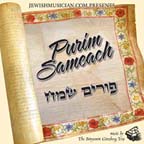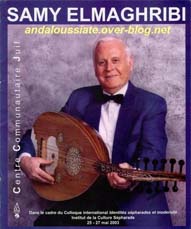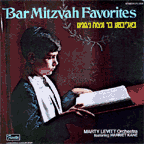From Flory Jagoda:
Please join me for a splendid afternoon of Jewish Sephardic music on
Sunday, April 6, 2008 at 4:00 pm.
The one hour concert will be at Congregation Etz Hayim, the synagogue that has been my religious home since I first came to America in 1946.
I was born in Sarajevo, Bosnia. Before the madness of the Second World War, 14,000 Jewish people called Sarajevo home and it was known throughout Europe as /Chico Yerushalayim/ (Little Jerusalem) for its thriving Sephardic community. Today, sadly, there are only 160 Jewish survivors living there and most of them are elderly and ill.
They need our help and I am committed to sending them the help that they need.
To Buy Tickets and/or make a donation, please contact:
Congregation Etz Hayim, 2920 Arlington Blvd, Arlington, VA 22204
703.979.4466 / fax: 703.979.4458
www.etzhayim.net
Checks can be made to: Congregation Etz Hayim - Sarajevo Benefit Fund
Tickets are $20, with a discount of $5 off for seniors and students.
Children 12 and under are free. Please reserve your tickets in advance by March 31st .
We are appealing to you and our entire community to come together and aid a desperate community that deserves a "/buen Pesah/". Your ticket to this benefit concert is just $20.00. 100% of the proceeds will go directly to the Sarajevo Jewish Center Community.
Joining me at this concert will be my talented and gracious friends who are donating their beautiful music and time to this cause, so dear to my heart. The performers include: The Altaras Ensemble, (featuring apprentice Susan Gaeta, Joel Leonard, Linn Falk, Joanne Stefanick, Margee Jervis, Betty Jagoda Murphy, Lori Jagoda Lowell, Tina Chancey, Chazan Ramon Tasat, Rabbi David Shneyer, Chazan Henrique Bass, Larry Robinson, Howard Bass and Alen Oresky. While this concert will be fun for all ages, there is complementary babysitting for our youngest guests.
Come, enjoy our music, and sing with us. If you cannot come, please consider making a contribution to Congregation Etz Hayim's Sarajevo Benefit Fund so that our friends can have the holidays be a true season of celebration.
Sincerely,
Flory Jagoda
To Buy Tickets and/or make a donation, please contact:
Congregation Etz Hayim, 2920 Arlington Blvd, Arlington, VA 22204
703.979.4466 / fax: 703.979.4458
www.etzhayim.net
Checks can be made to: Congregation Etz Hayim - Sarajevo Benefit Fund
Tickets are $20, with a discount of $5 off for seniors and students.
Children 12 and under are free. Please reserve your tickets
in advance by March 31st .
 With Purim due this week, it is time to mention
With Purim due this week, it is time to mention I just learned that on March 9, Samy Al-Maghribi, as Salomon Amzallag
was known, passed away. He was my oud teacher in Montreal in the early
1980s. Born in Morocco in 1922, he soon became a well-known figure in
Andalusian music and after emigrating to Canada, served for many years
as the Cantor of Montreal's Spanish and Portuguese Synagogue. After
retiring, he spent several years in Israel where he worked with the
Israeli Andalusian Orchestra and eventually returned to Canada. He was a
very fine singer, instrumentalist, and composer, highly appreciated in
both the Jewish and the Muslim worlds, and a great person. Some
information about his life and music can be found here:
I just learned that on March 9, Samy Al-Maghribi, as Salomon Amzallag
was known, passed away. He was my oud teacher in Montreal in the early
1980s. Born in Morocco in 1922, he soon became a well-known figure in
Andalusian music and after emigrating to Canada, served for many years
as the Cantor of Montreal's Spanish and Portuguese Synagogue. After
retiring, he spent several years in Israel where he worked with the
Israeli Andalusian Orchestra and eventually returned to Canada. He was a
very fine singer, instrumentalist, and composer, highly appreciated in
both the Jewish and the Muslim worlds, and a great person. Some
information about his life and music can be found here:
 Klezmer Friends,
Klezmer Friends,
 Keith Wolzinger has been reviewing prolifically, again. This is a good thing. He covers a fascinating disk put out by local (well, Western Massachusetts) musician Brian Bender, featuring some of my all-time favorite accompaniests (you know, folks like Alicia Svigals, Frank London, Stu Brotman, KCB's Grant Smith, NY percussion wizard Raquy Danziger, …):
Keith Wolzinger has been reviewing prolifically, again. This is a good thing. He covers a fascinating disk put out by local (well, Western Massachusetts) musician Brian Bender, featuring some of my all-time favorite accompaniests (you know, folks like Alicia Svigals, Frank London, Stu Brotman, KCB's Grant Smith, NY percussion wizard Raquy Danziger, …):